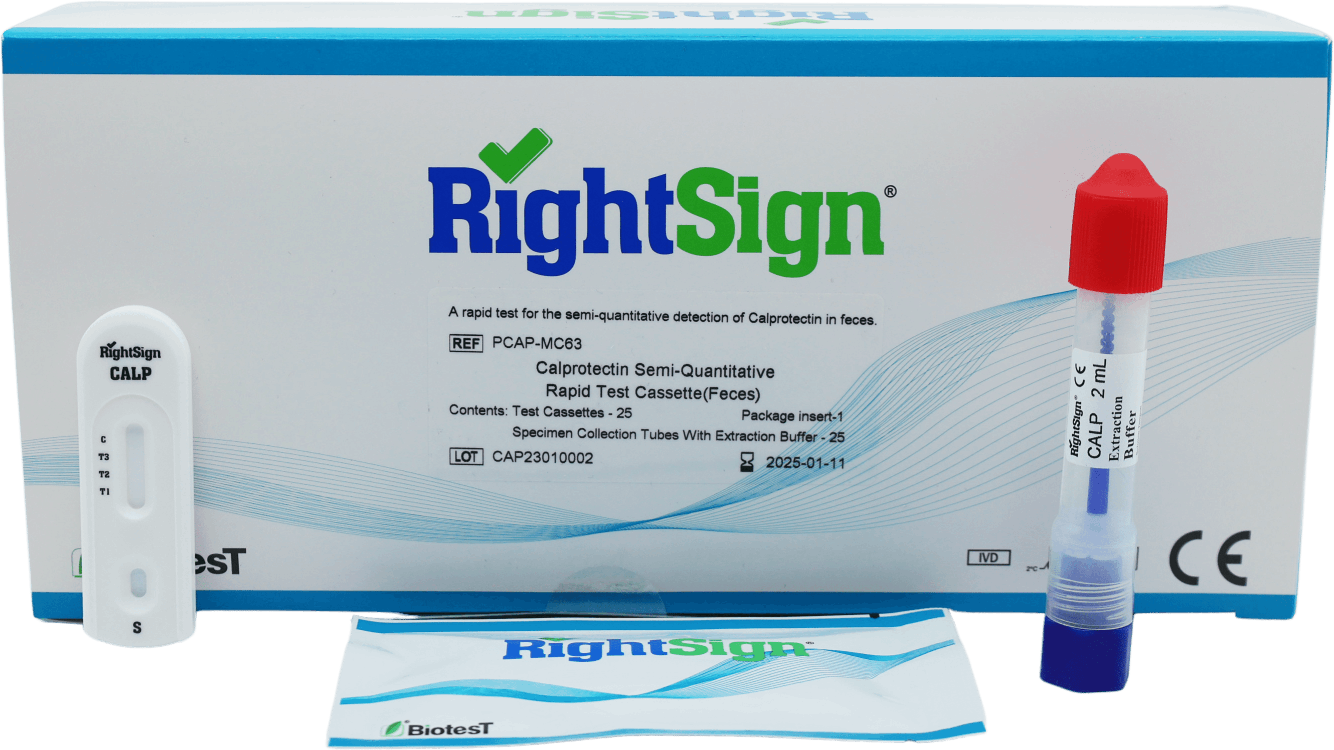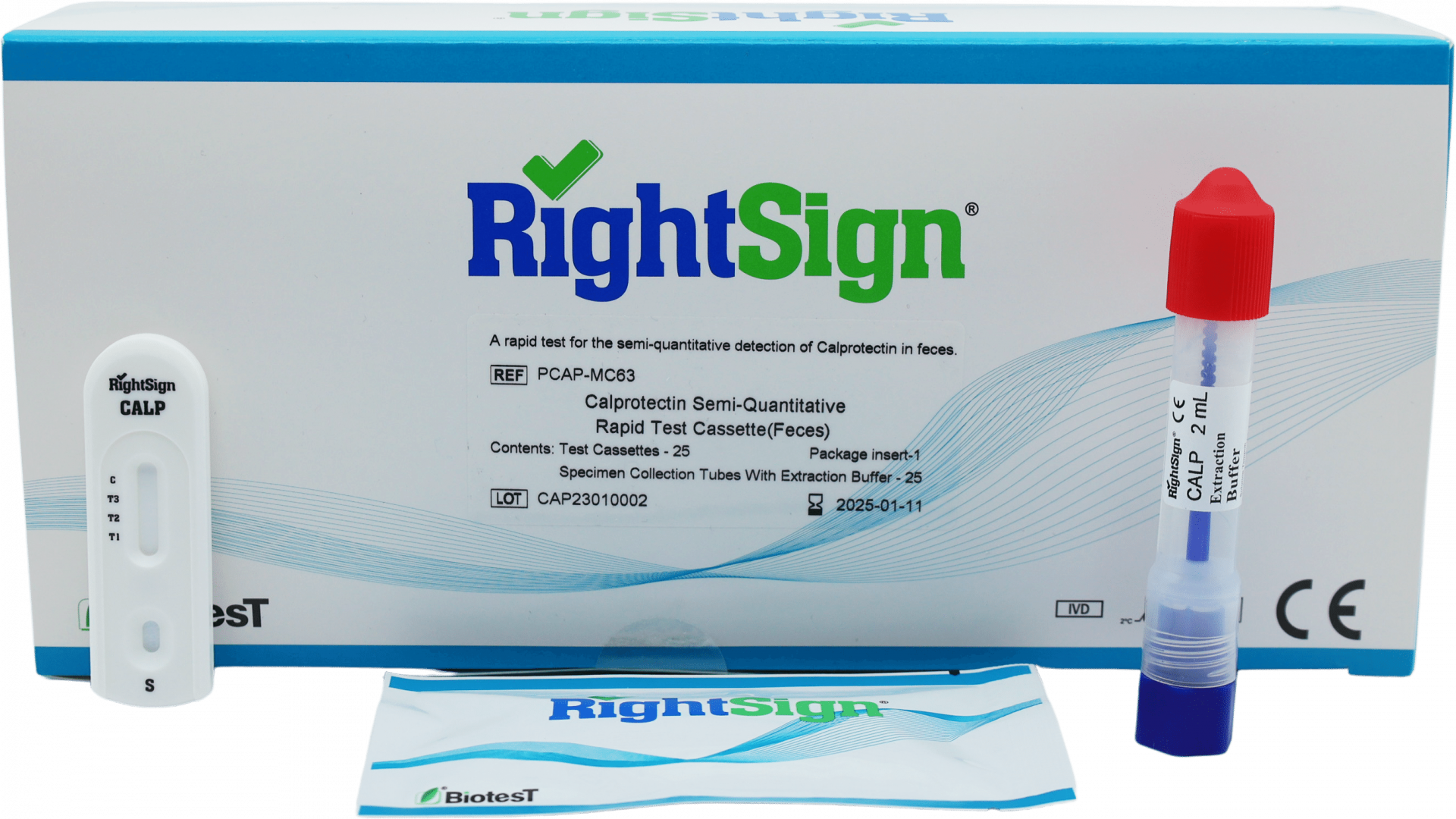Buy Fecal Calprotectin Test
Take advantage of the precision of our calprotectin tests in the OdemShop. They help to differentiate between inflammatory bowel disease and irritable bowel syndrome and are a decisive aid in diagnosis.

Fecal Calprotectin Test
The fecal calprotectin test represents a significant advancement in the medical community, particularly for purchase managers, doctors, elderly homes, and pharmacies involved in the care of patients with inflammatory bowel diseases (IBD) such as Crohn's disease and ulcerative colitis. This non-invasive biomarker assay is essential for both the diagnosis and management of IBD by measuring the calprotectin protein levels in stool samples. Elevated rates of calprotectin are indicative of intestinal inflammation, allowing for a clear distinction between IBD and non-inflammatory bowel conditions.
Calprotectin Test: What is it?
The calprotectin test is a non-invasive diagnostic tool used to assess the level of calprotectin, a protein biomarker, in stool samples. Elevated fecal calprotectin rates can be indicative of inflammation in the gastrointestinal tract, commonly associated with Inflammation-Related Bowel Conditions such as Crohn's disease and ulcerative colitis.
This test is regarded for its utility in distinguishing between inflammatory and non-inflammatory bowel conditions, providing clinicians with a valuable aid in the diagnostic process.
Calprotectin: What makes it important?
Calprotectin Measurements serve as a biomarker for inflammation within the gastrointestinal tract, playing a pivotal role in diagnosing and monitoring inflammatory bowel diseases.
The measurement of these tests is critical; a high fecal calprotectin rate often indicates active inflammation.
Precise quantification of calprotectin concentration via a stool test enables clinicians to differentiate between inflammatory and functional intestinal disorders, guiding targeted therapeutic interventions.
The apparent advantages of the Test
Understanding the these test reveals its significant benefits, particularly its non-invasive nature and its ability to provide quick, reliable insights into gastrointestinal health.
Non-invasive and patient-friendly compared to endoscopic procedures
High specificity for inflammation in the gastrointestinal tract
Cost-effective tool for screening out patients with IBS from IBD patients
Offers rapid results, facilitating timely clinical decision-making
Decoding the Results of a Calprotectin
The calprotectin test yields quantitative data crucial for evaluating gastrointestinal inflammation. Elevated calprotectinmeasurements typically indicate active inflammation, which may warrant further investigation for conditions such as Inflammation Related Bowel Conditions.
Conversely, low levels of calprotectin suggest a lower likelihood of significant inflammatory activity in the bowel.
Understanding Calprotectin concentration level
Interpreting the concentration rates of calprotectin in stool samples is a critical step in diagnosing and managing gastrointestinal disorders.
Low Calprotectin: Suggests minimal intestinal inflammation, often ruling out inflammatory bowel diseases (IBD).
Elevated Results: Indicative of possible IBD, warranting further investigation.
Calprotectin Levels in Children: Reference ranges may differ; pediatric consultation is recommended.
Calprotectin Analysis: A non-invasive, reliable marker for gut inflammation.
Analyzing the Calprotectin Test results
Decoding test results is essential for clinicians to differentiate between inflammatory bowel disease and non-inflammatory bowel conditions with precision.
Measuring faecal calprotectin levels provides a quantifiable calprotectin result; levels are also indicative of mucosal inflammation severity.
Results for calprotectin displaying increased rates require careful interpretation, as they may signal active inflammation, necessitating further diagnostic investigation or therapeutic intervention.
High calprotectin levels: What does it mean?
Elevated calprotectin levels typically indicate the presence of intestinal inflammation, necessitating a thorough clinical assessment to ascertain the underlying cause.
Inflammatory Bowel Disease: High calprotectin levels suggest active IBD, differentiating it from non-inflammatory bowel syndromes.
Intestinal Infections: Increased amount of calprotectin may signal bacterial or viral infections.
Calprotectin Assays Variability: Ensure standardization of assays to accurately interpret high calprotectin levels.
Other Conditions: Includes NSAID-induced enteropathy, colorectal cancer, and polyps.
Low calprotectin levels: What does it mean?
While elevated fecal calprotectin levels often signal inflammation, low levels generally suggest the absence of significant intestinal inflammation and are typically considered normal or non-pathological.
The test measures calprotectin, a protein found in white blood cells, in a stool sample. Low calprotectin levels indicate that patients with Gastrointestinal Inflammatory Disorders may not be experiencing active inflammation, guiding clinicians in differentiating between IBD and non-inflammatory conditions.
Calprotectin Test vs. Colonoscopy and Endoscopy
While the calprotectin test serves as a non-invasive marker of inflammation in the gastrointestinal tract, its diagnostic capabilities are not as comprehensive as those of colonoscopy and endoscopy.
Whereas colonoscopy and endoscopy allow direct visualization and potential biopsy of the mucosa, these test is limited to indicating the presence of inflammation, not its cause.
Consequently, in clinical practice, combining calprotectin testing with endoscopic procedures may optimize the diagnostic pathway for patients with suspected inflammatory bowel disease.
Limitations of the Fecal Calprotectin Test
Despite its non-invasive nature and utility in screening for inflammatory bowel diseases, the fecal calprotectin test is not without limitations, especially when compared to more definitive diagnostic procedures such as colonoscopy and endoscopy.
Sensitivity: May produce false negatives for certain bowel conditions.
Specificity: Less effective in distinguishing between types of gastrointestinal disorders.
Turnaround Time: Delayed results compared to immediate findings from endoscopic assessments.
Comprehensiveness: Cannot visualize mucosal lesions or obtain tissue biopsies.

Calprotectin Tests for the diagnosis of different diseases
These tests are essential in the early detection and ongoing management of Inflammatory Bowel Disease (IBD), and are a key non-invasive biomarker for intestinal inflammation.
For Purchase Managers, Doctors, Elderly Homes, and Pharmacies, it is crucial to understand that elevated calprotectin presences are a strong indicator in diagnosing and tracking ulcerative colitis, mirroring the degree of mucosal inflammation.
Role of Fecal Calprotectin Test in diagnosing Inflammatory Bowel Disease (IBD)
These Testis an essential, non-invasive marker for detecting intestinal inflammation, crucial in the accurate diagnosis and effective management of Inflammatory Bowel Disease (IBD).
IBD Differentiation: It accurately distinguishes between IBD variants like Crohn's disease and ulcerative colitis, and other non-inflammatory bowel disorders.
Treatment Monitoring: It effectively tracks patients' response to treatments, signaling either remission or flare-ups.
Calprotectin Detection: It identifies calprotectin released by neutrophils within the gastrointestinal tract, a tell-tale sign of inflammation.
Endoscopy Reduction: It minimizes the necessity for repetitive, invasive endoscopic procedures.
This test is a valuable tool for Purchase Managers, Doctors, Elderly Homes, and Pharmacies seeking to improve patient outcomes and streamline the care process.
Relevance of calprotectin in ulcerative colitis
Building on its role in differentiating IBD types, calprotectin levels are particularly telling in the diagnosis and management of ulcerative colitis. Their correlation with disease activity aids in clinical decision-making. The use of fecal calprotectin is recommended for monitoring inflammation, as calprotectin can be used to assess treatment response.
Moreover, calprotectin is a useful biomarker. Calprotectin is used to distinguish between Crohn's disease and ulcerative colitis.
Influence of the calprotectin level in Crohn's disease
In the clinical evaluation of Crohn's disease, measuring fecal calprotectin levels plays a critical role in diagnosing and monitoring intestinal inflammation with high specificity and sensitivity.
Calprotectin is activated during neutrophil degradation, signaling inflammation.
Calprotectin and lactoferrin are biomarkers for gastrointestinal disease activity.
The use of calprotectin analysis aids in differentiating between IBD and IBS.
Human calprotectin consists of proteins indicative of mucosal health.
Where to buy Calprotectin Tests in Wholesale
Healthcare providers and medical supply distributors seeking calprotectin tests in wholesale quantities can source them from specialized diagnostic manufacturers or large-scale laboratory suppliers known for their reliability and quality assurance.
The test comes designed to be conducted either in the comfort of your own home or within a laboratory for testing.
Utilizing wholesale options can significantly save money for the NHS, where calprotectin is also a key inflammatory marker.


